A ‘steno’ format. A depleted word. A still personal word. A simulation. A read-write simulation. A truncated octahedron.
(This is the first of a new type of post on this blog—a “steno”. This format
will house ‘thoughts’/‘discussions’/‘works’—much like an old-time c2-style
or everything2-style wiki page that always ended up being an amazing catastrophe. The
“steno” acts as hasty notes, links to other places around the blog, recurring
nexus, link stations, breathers maybe, between the other articles and notes,
revolving around a kind of ‘topic’/‘idea’.)
(In a way, I realize that starting off with an aside is a bad way to get anyone
jazzed about some new ultimately pointless post styling—but I purposefully
want these pieces to be less heavily edited and focused than all the other things.
So, by throwing in a wankery introduction, it acts as a kind of gate you have to
get through. So if this is too self-indulgent or tangential then you know to go
away and I just continue and we’re all fine—although I think we’re deep into
peak self-indulgence now that ‘people’ have evolved into ‘influencers’. Gah, that
sounds condescending—and it is—and, worse, I think being condescending—especially
in public like this—is probably much, much more destructive than influencing.)
(This isn’t just a gate, though, I want to mark this as the first steno, so that
I can point to it later—and have it contain the reasoning behind this. Sure, I
could make a separate steno that goes into those ideals, but it’s also kind of
tied into the topic of ‘blogging’ anyway, so it’s like: why not just explain the
thing and then flow right into it and then let it be for awhile and then come
back and build on to it and—this is all just like what h0p3 does on his pages,
this whole thing is a chance to have a part of that—and, again, what c2 had,
what everything2 had/‘has’—it’s almost as if they were a fad. Like a sudden explosion
of truncated octahedrons.)
Blogging simply made the static page seem alive. Then it turned into feeds and
streams and the rate of speed was dramatically hiked up.
It’s possible that the word ‘blog’ is depleted. I think it was entirely stupid,
but nostalgia has made it kind of neat. Like those little dixie cups dispensers
that people used to have stuck on their bathroom walls. How great would it be
to brush your teeth with such a companion again?
(This is unrelated, but if we are in a simulation, then we are probably deep
into many, many simulations. It seems unlikely that we are only ever one-level
removed from ‘reality’. It makes me feel like we’re probably either not in a
simulation or that our inability to leave the simulation makes this absolute
reality regardless.)
(This IS starting to feel strange. It does feel self-indulgent. It feels like it’s
more for me than for you. Because I can’t rightfully expect anyone to read this—much
like trying to read all of Wikipedia, there’s a threshold you have to set for yourself,
that you’re not going to spend the time to read this kind of tripe. I don’t respect you
for this, I don’t respect either of us. Maybe I never should have. And, for myself,
it’s good to write carefully—to draw you in with great care and to not act this way.
On the other hand, it’s hard for me to possibly know what to do with any of these pages!
There are recipe and howto articles. There are anecdotes, punchline type things.
You can easily add your two cents to a thought that’s propagating around. But I don’t
know—I’ve never lived in a large city, and rarely even been to a really massive city,
and I find myself looking at the buildings, just the sound of the air is so strange to
me, the feeling of being on a street that is so worn and has fragments of millions of
boots and beards and bits of sandwiches. I can see that it is an inverted rock tumbler,
where the street is being tumbled by all of the things colliding against it. It is
erosion of an industrial strength. But that wouldn’t be interesting to someone in
a city, would it?)
(And then there is the experience of swimming—and often when we are swimming,
we just wander around and work ourselves, talk and float. But if the pool is
empty and you go to the bottom and hold your breath, it is the opposite of the
city, it is insanely quiet, or an alien kind of subterranean quiet, and it feels
like you have entered another level of the simulation, where you are a different
person—you can do advanced yoga things down there that you normally wouldn’t
be able to do and you sound differently, the bubbles that burst out in spurts
produce loud, spontaneous waves and that’s what we sound like down there. And
that, also, might not be interesting to anyone—or it might be interesting for
everyone. Revealing that I also don’t know what’s interesting is a poor choice!)
Anyway, there’s about fifty reporters behind that door—real ones, not bloggers.
— Tony Stark, Spiderman: Homecoming, 2017
I like that ‘blog’ has remained a non-corporatized word in many respects. A ‘blogger’
is an ‘amateur’; the ‘blogosphere’ is the peanut gallery. It is a futile endeavor—and
this is all good, because it important that some of these words stay personal.
Ok, so:
- A blog is still the state-of-the-art as far as the personal ‘home’ online.
- And, actually, all the credit goes to the browsers—HTML and CSS are pretty
marvellous: they’ve gotten better and we have choices, it’s an impressive platform
overall.
- A static blog is fantastic. You can always back it up and move it anywhere.
- No one seems to have figured out what to show on the first page yet. A list of
recent things is almost the same as a list of random things—until a visitor knows
where they are? But how do they know where they are?
h0p3 has done a good thing with having an actual front door. (In a
way, it feels like an old-school BBS.)
- RSS is gone for me.
- I don’t want to read unstyled content.
- Yeah, don’t want to be fed posts everyday, I want to drop in.
- I could see a use in a blogroll that colors the sites that have had activity.
But no stats or anything.
- It would trouble me if I was in your face everyday.
- I still understand if you like RSS and it’s all about the raw text and links
for you.
- Indieweb-style replies and mentions are a huge leap forward. It is just so
flexible—we can have threaded discussions, forums, e-mail and new-style hypertext
wiki back-and-forth madness simply by adding Webmentions. (See These Indieweb
Folks Just Might Be Onto Something.)
- Beaker Browser means you don’t even need a server to host your blog. This is
so straightforward that it’s mindblowing. The browser has hit a point where it
has become fully read-write. (See A Web Without Servers.)
- I think you have to pack it all up at some point. Perpetual blogging seems—arrogant?
- I wonder if there would be a way to let other bloggers take the wheel from
time to time. (This seems along the lines of how Sphygmus is writing into h0p3’s
wiki through this ingenious tactic of simply sending him wiki-formatted text.
Since h0p3 is bound by creed to publish in full anything that comes his way,
Sphygmus can effectively communicate with his audience directly—though I start
to worry that h0p3 is just going to become another silo. 😎)
- It is important to repost stuff that has been overhauled. If we revisit writing,
we move away from a strictly ‘chronos’ view of the blog and toward a focus on
where thought is concentrated.
- Yes, so salience. Perhaps this is what the algorithms are attempting and FAILING
at. So give it to the nomad. How does a nomad sprinkle salience?
As for the software behind this particular blog, I call it Homeshade. I moved away
from Jekyll the first week of September 2018. It was taking two minutes to generate
my blog. That is down to three seconds now. (I’m sure Hugo could have done that, too.
But I had other things I wanted to do as well—such as putting it into the Beaker
Browser so I can just do everything from there.)
The technical part of this discussion is, fortunately, not that interesting really.
The things that excite me out there right now are just being done with plain
HYPERTEXT. (There’s another great corporatized word that never even got to be
lame!) Homeshade is only a refinement, it is not a big deal. The point is only
to utilize those things that we have that are under-utilized—like swimming on
the bottom long enough to shut the sound out.






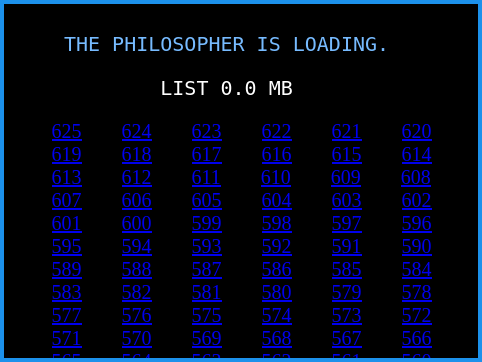

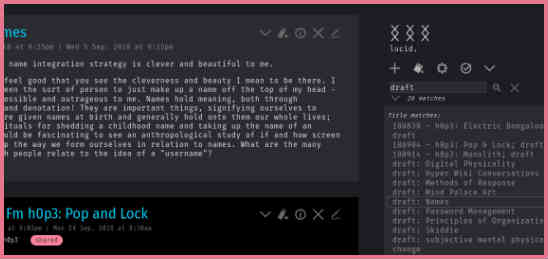
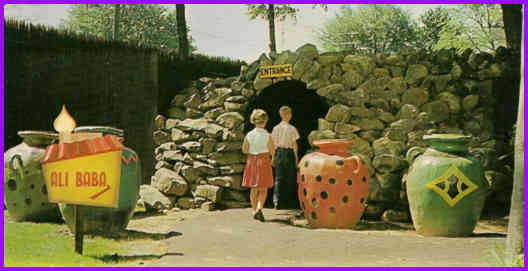
 and feel like the nature of my blog would
turn this into a type of ‘broadcast’ that can still receive ‘thumbs up’ and such
sordid things. (Ed.: You can comment on this post, but ‘likes’ and ‘mentions’
are disabled to respect this sentiment!)
and feel like the nature of my blog would
turn this into a type of ‘broadcast’ that can still receive ‘thumbs up’ and such
sordid things. (Ed.: You can comment on this post, but ‘likes’ and ‘mentions’
are disabled to respect this sentiment!) )
)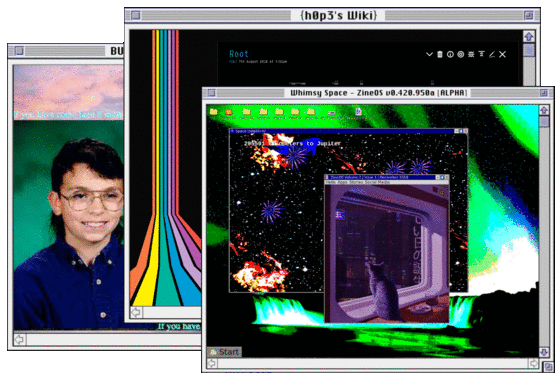


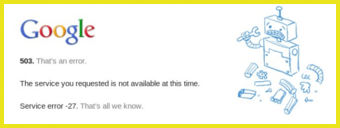





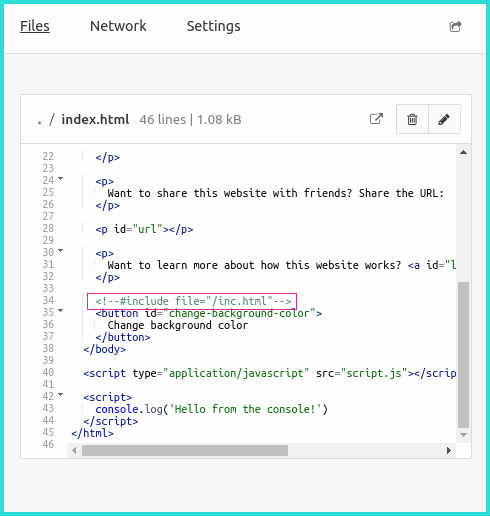
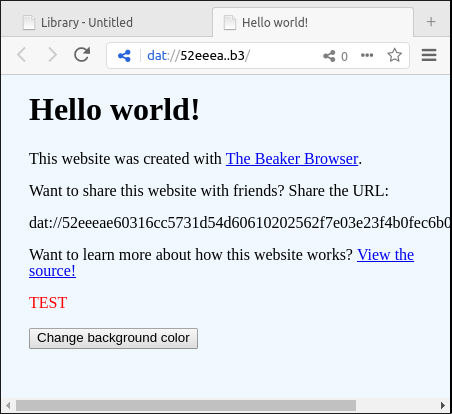



Reply: Why I’m Leaving Micro.blog
Couple questions about ‘owning’ your content on the Indieweb.
A few follow-up questions to this:
In the old days, when an ISP (or your college or whatever) would give you a public_html folder to put your website in—did you own your content?
In modern times, when you rent a virtual server slice to run Apache and serve your website from a Wordpress database—do you own your content?
If you put up an essay on a pastebin site—do you own your content?
I don’t really see the difference between using FTP to pass your stuff ‘in’/‘out’ of a public_html folder and using Micro.blog’s API to pass your stuff ‘in’/‘out’. If you can get your stuff ‘in’ and ‘out’—isn’t that the key? The API is just a different kind of FTP.
The public_html folder isn’t owned. The virtual slice isn’t owned. The domain isn’t owned. The pastebin isn’t owned. The API isn’t owned. What does it mean to ‘own’ anyway?
This is one thing that is really cut and dry with Beaker Browser. You do own the content because it originates directly from the machine under your fingers that you own.
(Not trying to defend Micro.blog or weigh in on the other interesting matters of this post—perhaps I should just shut up—just thinking about this one thing.)